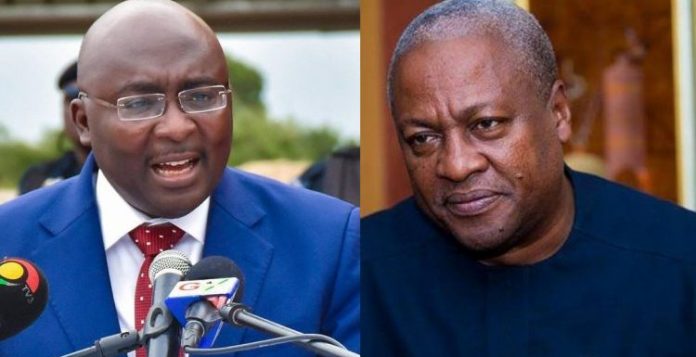
The latest poll by Global InfoAnalytics suggests the 2024 presidential race is tightening
amidst a nationwide tour by the vice president Dr Mahamudu Bawumia (DMB).
The poll shows that Dr. Bawumia has narrowed John Dramani Mahama’s (JDM) lead in the poll by approximately 3% compared to the April 2024 poll. JDM now leads DMB 51.1% to 38.2%, Alan Kwadwo Kyeremanten (AKK), 5.3%, Nana Kwame Bediako (NKB), 4.6% and others 0.8%.
The poll shows that in the event of a runoff, JDM is on 52%, DMB, 42% and 6% of voters are undecided, suggesting that the poll is currently unlikely to head to a runoff.
In what could be a shock to the political duopoly in Ghana, the poll shows NKB making
significant gains in the Central, Ashanti, Eastern and Volta regions. NKB leads in Abura
Asebu Kwamankese and Kade constituencies in the Central and Eastern regions respectively.
The race also shows a dramatic shift in the Central region during the period as JDM drops
from 51% in April 2024 to 39% in the July. The poll also shows DMB haemorrhaging in the
region as he recorded a decline from 45% in April to 30%. AKK and NKB made huge gains in the region after they lost grounds in the April poll. AKK and NKB are now tied in third and fourth place with 13% of the votes each.
Dr. Bawumia also recorded significant gain in the Ashanti region. He now attracts 66% of the vote compared to 54% recorded in the April. JDM on the other hand, suffered a decline from 31% to 22% in July. AKK also saw a decline and now on 8%, from 12% in April. NKB doubled his votes in the region as he attracts 4% of the votes in July compared to 2% in April poll.
The poll also shows that the race is tied among first-time voters as JDM and DMB are
locked on 41% apiece. AKK attracts 8% of first-time voters and NKB, 9%. JDM led first-time voters 52% to 33% in the April poll.
Overall, 4.2% of voters are undecided and 5% said they will not vote. The poll shows that
22% of voters who are undecided are from the Greater Accra, Ashanti, 16%, Western, 12%
and Eastern, 11%. For those who will not vote, 19% are from the Greater Accra, Ashanti
region, 22%, Eastern region, 17% and Western region, 13%.
On the direction of the country, 63% of voters believe Ghana is headed in the wrong
direction while 27% believe it is headed in the right direction. 47% of voters also believe
that their standard of living compared to a year ago has worsened, while 21% say it has
improved, 27% said it has not changed and 5% did not have an opinion.
Majority of voters are unhappy with the performance of President Nana Akufo Addo. 60%
disapprove of his performance while 35% approve of it and 6% did not have an opinion.
The Ghana Police Service and Electoral Commission suffered a blow in public confidence during the period. The poll saw voters who have confidence in the police to maintain order during the elections declining from 64% in April 2024 to 58% in July while those who have no confidence jumps from 28% to 33%. Similarly, the Electoral Commission saw a decline in voters’ confidence as those who have confidence in their ability to organise free and fair elections dropped from 59% to 53% while those who do not have confidence in the commission increased from 32% to 38% during the period.
On the “One student One Tablet” policy of the government, the poll found 55% of voters support it while 29% do not support it. However, when voters were asked if the policy is likely to influence them to vote for the government, 58% of them said it will not influence them, 29% said it will whilst 13% were indifferent.
On the question of whether projects being undertaken just in time for the elections could
influence voters to vote for the government, 29% of voters said it will influence them, while 56% said it will not influence them. 15% remained indifferent.
When voters were asked whether they would accept inducement/bribes to switch their votes, only 7% said they would accept and vote for the candidate.
Economy, jobs and education remain the three most pressing issues that will influence their
decision (Economy 73%, Jobs 69% and Education 50%).
Source: Kasapafmonline.com



